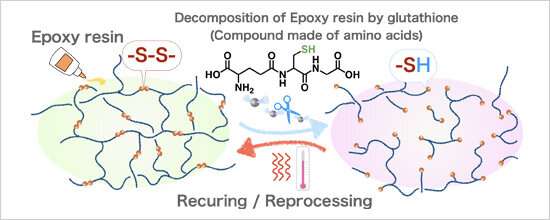
Epoxy resin is a type of
thermoset resin commonly used in glue, paint and composite materials. NIMS and
ISMA have developed a new thermoset plastic recycling system capable of easily
decomposing epoxy resins in an aqueous solution of a naturally derived peptide.
The use of this system may promote the reuse and recycling of plastics,
including carbon fiber reinforced plastics (CFRP)—carbon fibers combined with
an epoxy resin matrix—by a wide range of industries.
Environmental pollution caused by plastics—particularly in the marine environment—has raised global concern about urgent need to promote plastic waste recycling. Some recycling methods have already been developed to decompose thermoplastic resins used in containers and packaging through thermal and chemical processes, and efforts are underway to put recycling plants into practical use. On the other hand, a method for recycling thermoset resins, including epoxy resins, has yet to be developed due to their poor thermal degradability and low solubility in available solvents.
This research team recently developed an epoxy resin recycling method capable of easily decomposing epoxy resins in an aqueous solution of glutathione—a naturally derived peptide. Glutathione has the ability to remove toxic substances from the human body. Inspired by this detoxification reaction, the team modified the structure of epoxy resin by incorporating disulfide groups (-S-S-) into it, making the resin molecules cleavable by the thiol group (-SH) of glutathione). In this system, epoxy resins immersed in an aqueous solution of glutathione were confirmed to dissolve completely without leaving any solid remains. Decomposed epoxy residue is then recovered and transformed into epoxy resins again. The storage modulus (a stiffness indicator) of the recycled resins was virtually the same as that of the original resins and their performance was only slightly affected by repeated recycling. Because glutathione rarely occurs outside living organisms, there is no risk of it accidentally decomposing epoxy resins still in use under normal conditions.
There are no other established recycling techniques capable of separating largely incombustible CFRP into carbon fibers and resins and retrieving these materials. The use of this recycling system may promote CFRP recycling. Moreover, this system is applicable to the recycling of other types of resins and composites in addition to epoxy resins. In future studies, the team plans to apply this system to the recycling of a wide range of commonly used plastic materials, thereby fostering the development of a circular plastic economy.
This research was published in Science and Technology of Advanced Materials on July 16, 2021.

 Previous page
Previous page Back to top
Back to top







